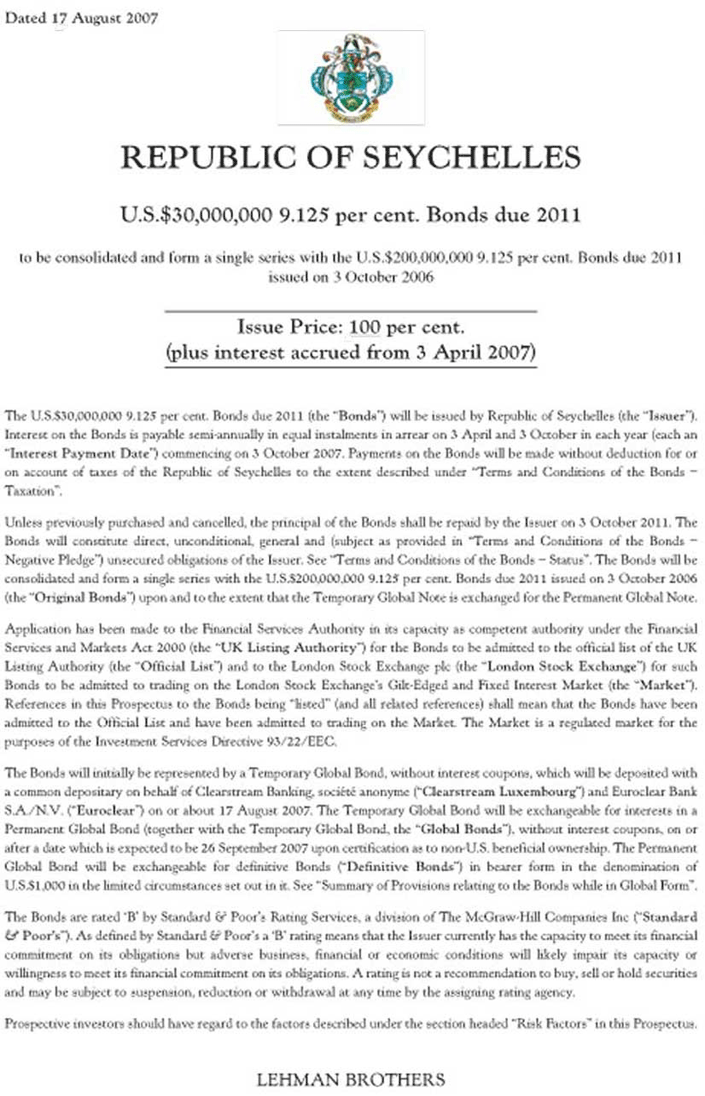

Mr. Danny Faure, Minister for Finance and second designated Minister, on Tuesday candidly admitted to the National Assembly that the government paid a whopping US$1,000,000 in fees to the investment bank Lehman Brothers to underwrite and manage the issuance of a US$30, 000, 000 junk bonds on the International Financial Market place.
However, the Minister did not divulge how much the government had paid the same investment bank to manage the US$ 200, 000, 000-bond issue in September last year to which the current issue will be attached to create an issuance of US$230,000,000 altogether. The assumption is that if the government paid a US$1, 000, 000 to Lehman to manage the issuance of US$30, 000, 000, it must have paid considerably more for the US$200, 000, 000.
Minister Faure said that the government decided to explore the possibility of raising money on the International Financial Market after it received a B sovereign credit rating earlier last year. But the B rating had a caveat. Here is what Standard and Poor, the rating agency said in its report, “The ratings on the
However, economists have contended that the government resorted to the International Financial Market to raise money as a measure of last resort, since it could not get loans anymore in the usual way as it had failed to fulfill its repayment obligations to these institutions. At least with the commercialisation government need only to come up with sufficient money to pay interest each year until 2011.
The Minister also informed the National Assembly that the government would be paying a total of US$21,000, 000 in interest each year on the totality of the bonds i.e. on US$230,000,000. There are fears, however, that the US$30,000,000 raised would be used to pay some of this year’s interest on the US$ 200,000,000, which is due on 3 October. If that is the case, what will happen next year? How long can a piece of string be stretched?
Faure said the government will be able to meet the repayment of the capital (US$230,000,000) through direct foreign investment coming to Seychelles, which he said stood at an impressive US$146, 000, 000 last year alone and US$126,000,000 this year to date. Minister Faure said that the government expects a total of US$270, 000, 000 to enter the country by the end of 2007 as direct foreign investment.
If this is the Minister’s thinking, sadly our country is bound to go to the dogs as the expression goes. Direct investments is not a bank loan to the government. To claim a share of it Government must tax the returns of these investments. Unfortunately, all the direct investments have been made because government has offered tax concessions. So Faure will be disappointed to know there will be no money for the government in the short term.
At least the Minister was surprisingly open to admit that some of the US$30,000,000 raised will be used to clear some commercial arrears in the pipeline. He said that in October 2006, there was R.452, 000, 000 in the pipeline. R.155, 000, 000 of which, he said, had already been withdrawn voluntarily. He did not volunteer to explain why. Was it because these people had lost faith in the banking system providing them with foreign exchange? Or was it because they had alternative sources, such as the parallel market? It appears that only a small sum is left.
But Faure will not finance SR70,000,000 of pipeline because, he said, these deposits were not supported by bills of entry. Once again, the SPPF moves the goal post. When it was created in 2004, under the promise of MERP this condition was not attached. The pipeline was meant to remove rupees from circulation to wait for dollars to arrive from tourism revenues to buy them. There was at least some economic logic to it.
Perhaps Faure is too ashamed to admit that MERP has been a complete failure and that it actually cost our country dearly. But all indications are that like his predecessor President Michel, in the Ministry of Finance, he has absolutely no idea what to do. Except Faure is costing us dearly too in the form of high fees and high interest cost of borrowing. The vicious circle keeps turning.
